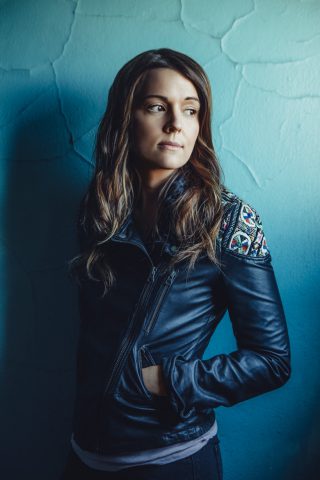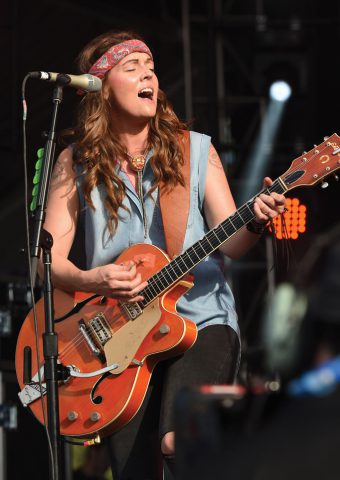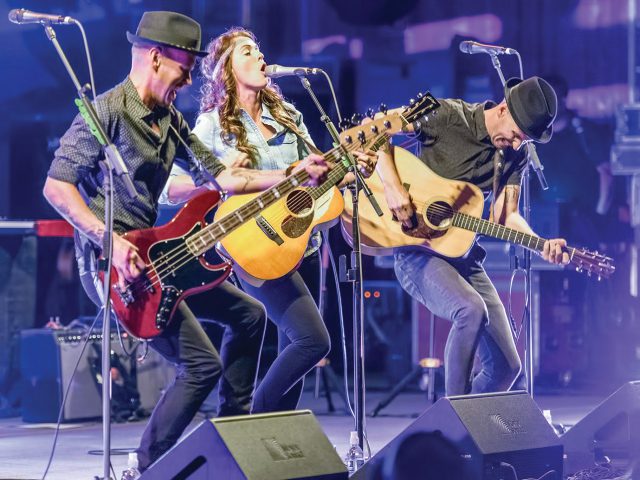In 2005, Rolling Stone called alt-country/folk-rock singer-songwriter Brandi Carlile an artist to watch, and over the past decade, she has certainly proven herself worth watching. Her 2007 hit song, "The Story," was featured everywhere from the Olympics to Grey's Anatomy, and she counts artists like Elton John and Amy Ray as fans. (Both collaborated with her on her third album, Give Up the Ghost.) Her fifth and latest album, The Firewatcher's Daughter, has earned her the best chart debut of her entire career and impressive reviews.
We talked with Carlile (who came out as a lesbian in 2002) about her new album, along with a whole range of other topics, including her commitment to environmental and humanitarian causes, her new daughter and how country music really feels about LGBT artists.
GO: You founded an environmental and humanitarian organization called the Looking Out Foundation. Can you talk a little about how that got started?
BC: The Looking Out Foundation is mostly a humanitarian and social justice outreach foundation, at the moment, but many people don’t know that it started out as an environmental effort in 2006. General Motors asked us permission to use our song in a television commercial during the Olympics to sell a fleet of their cars. … For a band with only one proper record out, still touring in vans, and sharing beds and hotel rooms, it was a difficult decision. But we responded with a resounding NO—not only because of the unsustainable production of a few GM vehicles, but also because of a major American car manufacturer’s incestuous relationship with Big Oil.
GM then reached out a second time, concerned with why such a small band would say no to such a massive opportunity, and we responded with our environmental concerns. They had a meeting and decided to change the commercial itself to only promote GM’s environmentally sustainable cars, hybrids, clean diesel; they showed the first American family on television plugging in an electric car, gave a nod to the invention of the hydrogen engine and agreed to let us help write and approve the text. It was an unprecedented honor and the concept of not preaching to the choir but to millions of American car consumers, paired with music and clean energy, was a really exciting thing for our band. We took it very seriously and donated all of the money we were paid by GM to a handful of grassroots environmental groups. That was the beginning of the Looking Out Foundation.
It’s remarkable that you had such an impact on GM. Have you done anything to help the music industry as a whole become greener?
Music is the universal language between all walks of life, but touring is a messy business, and it leaves a Sasquatch-sized footprint on the earth. A few cool organizations have realized that bands everywhere need to make a better effort to reduce the impact that their industry has on the environment. … REVERB is one of these organizations, and the Looking Out Foundation has given several artists Green Grants to offset the costs of such greening.
The Firewatcher's Daughter is your first album on Dave Matthews' ATO label. Previously, you were on Columbia. Was that a personal choice to change labels, how has that transformation gone, creatively, and what led you to choose ATO?
After almost 10 years of being on Columbia Records, our time and contract there were fulfilled. It is every teenager’s dream who has ever picked up a guitar to be on Columbia Records, and it was no less the case for me—a total honor and a blast. There are always going to be corporate walls whenever you participate in an organization that needs to report annual numbers to the folks upstairs. Not having those concepts infiltrate my creative subconscious has been the single greatest part of watching that relationship fade into the sunset. I chose ATO for the same reasons that an artist would choose to be in a band: really interesting, talented people who have a lot to offer; creative minds; great collaborators; and a great group of people to sit and have a beer with.
One of the genres you work in is country. Do you think things have gotten better for gay country artists? And did any fans or country music professionals react badly after you came out?
The word “country” has begun to define such a small niche of roots-based Americana artists that if I’m honest, I’m not even positive what it means anymore. Nashville as a city and as the birthplace of “country music” is changing very quickly, along with the rest of the country. To me, it has felt like a very warm and welcoming place for gay Americana/roots/country artists, especially in the last five years. I played the Grand Ole Opry, and Wanda Jackson smacked me on the ass. I got a beautiful letter from Dolly Parton. I shot whiskey with Kris Kristofferson. I’ve inappropriately duetted with John Prine. Willie Nelson offered to get me high at my bachelorette party. Kasey Musgraves stole my grandma's wheelchair and formed the gay-straight alliance for the ‘tomatoes’ of radio, and I sang Miranda Lambert and Blake Shelton down the aisle at their wedding. All this inclusiveness for a gay girl in country music has been a sign of beautiful things to come for the country music LGBTQ contingency.
You’re going to be performing at Radio City Music Hall in New York City on October 9. How does it feel to be headlining the legendary venue, and do you have any special treats for fans coming to that show?
It feels so massive to me that I don’t think I’ll believe I’m doing it until I’m standing on the stage playing my first song. I hope they don’t misspell my name on the giant sign! I always have a few surprises up my sleeve for NYC.
What are your favorite songs from your new album The Firewatcher's Daughter and why?
There are lots of reasons to love different songs on The Firewatcher’s Daughter for me. The songs I love to play right now are the rockers, “The Firewatcher’s Daughter” and “Mainstream Kid.” But the ones I love to listen to with my headphones on are “The Eye,” “Heroes and Songs” and “Beginning to Feel the Years.”
The mainstream music scene is basically dance pop, rap and hip-hop these days. How does an artist like yourself, who works outside those genres, get noticed. How have you dealt with that challenge, reaching the fans and others who would want to discover your music?
I’d rather get noticed for not wanting to get noticed. In regards to popular music, people still want a direct line to what’s true and real about humanity and the world. They can’t count on the media; they can’t count on pop radio, or any other forms of mass consumerism. Most often, they know they can only count on music outside of the mainstream for those universal truths. No one can live on cotton candy.
You married your wife, Catherine, in 2012. Did married life and a child on the way influence how you made this album?
Family life has made me a happier person on a deep fundamental level. It’s not that it’s for everyone, but I feel that I’m on the path to fulfilling something that I’m meant to do here. I used to worry a lot about how happiness would affect me, as a songwriter who is influenced by angst, grief, change and sometimes anger. Tim [Carlile’s collaborator] once told me that you can write even better sad songs when you’re fundamentally happy; this has been completely true for me. All the darkness is still there, like a passenger; I’ve just become a better translator for it in my music. The songs on The Firewatcher’s Daughter are the most filled with turmoil, but written by me at my most content.
When do you feel like the music bug hit you? How old were you, and what made you so determined to turn music into a career?
I was eight years old, and I sang a song written by Johnny Cash, performed by Rosanne Cash, at a little place in rural Washington state called the Northwest Grand Ole Opry. It wasn’t like going to the fair and riding a roller coaster, even though the rush was just as intense. It felt real to me, like it was the way my life could turn out if I believed in it enough.
What do you want to accomplish in your life that you haven't already?
The birth of my daughter Evangeline brought one really important perspective to my life that I wasn’t expecting. It’s given me an absolute intolerance on a global level to child suffering everywhere. I’ve always found it unacceptable, but now its immediacy has become one of my life’s passions. I can’t differentiate between the well-being of my own child and anyone else’s child any longer. I would love to see an end to aristocracy and the apathy that we all too often feel in regards to the suffering of other people’s children. I would like to point the hull of The Looking Out Foundation towards humanitarian issues focusing on children in third world countries and using our music to further that effort.





What Do You Think?